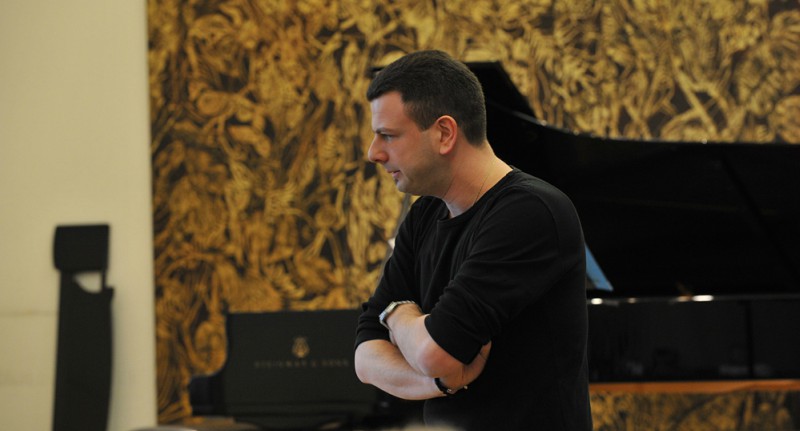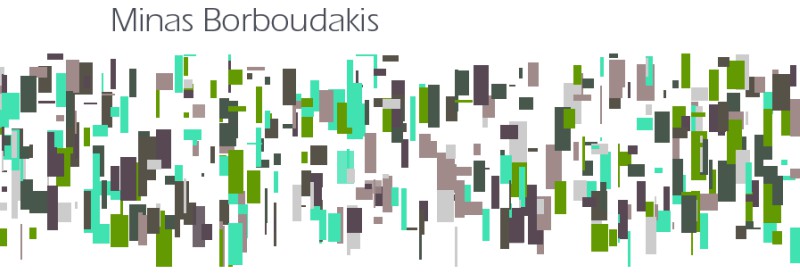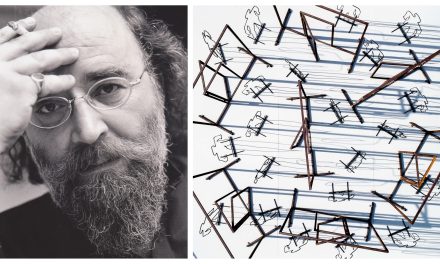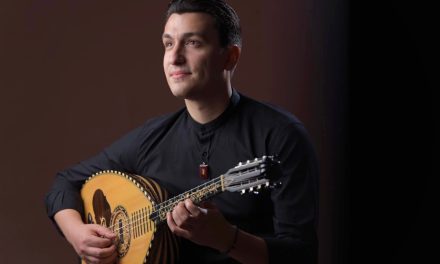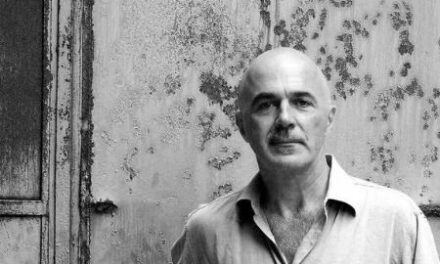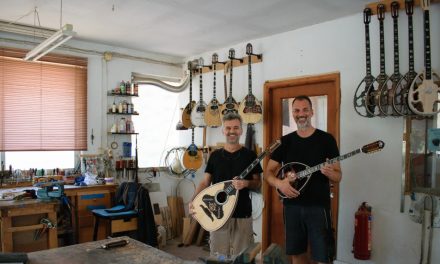Minas Borboudakis is a Greek pianist and composer of international acclaim, who lives and works in Munich, Germany. Born in Crete, Borboudakis started studying piano and music theory at an early age and, at eighteen, he continued his education on piano and composition in Munich and Hamburg. Throughout his studies and career he has earned various scholarships and prizes, such as the third place at the Günter Bialas International Chamber Music Competition (2002), the Bayerischer Kunstförderpreis for musical composition (2004), the Rodion Shchedrin Chamber Music Award (2005) and the Christoph and Stephan Kaske Foundation prize.
Borboudakis’ compositional style is influenced by microtonality, percussive timbres, and sliding sounds. He has been commissioned musical works by renowned musical institutions, and his compositions have been performed by famous orchestras; these include the Bavarian Radio Symphony Orchestra, the Radio Symphony Orchestras of Munich, Stuttgart and Saarbrücken, the RAI National Symphony Orchestra, the Athens State Orchestra, the American Wind Symphony Orchestra and the Tonhalle Orchestra Zürich.
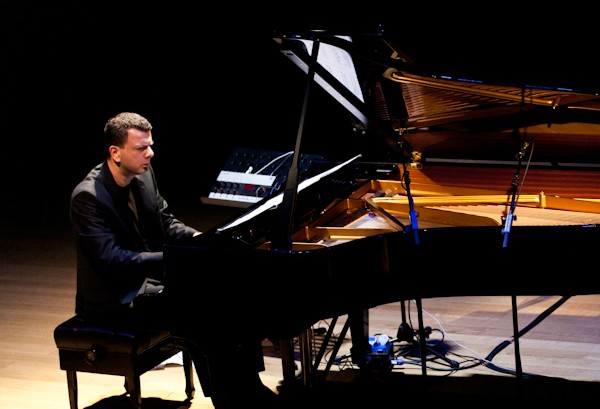 He has collaborated with institutions and festivals such as the Bavarian State Opera, the Deutschlandfunk public broadcasting radio station, the MDR Musiksommer, the Kasseler Musiktage and the Young Euro Classic music festivals, while his first composition for music theatre, liebe. nur liebe (love. only love) premiered at the 2007 Munich Opera Festival. In March 2018, the Greek National Opera premiered Borboudakis’ opera Z, a rare example of a Greek-speaking opera, on a libretto by Vangelis Hatziyannidis, under the stage direction of Katerina Evangelatos. We spoke* with Minas Borboudakis about his recent works and his sources of inspiration.
He has collaborated with institutions and festivals such as the Bavarian State Opera, the Deutschlandfunk public broadcasting radio station, the MDR Musiksommer, the Kasseler Musiktage and the Young Euro Classic music festivals, while his first composition for music theatre, liebe. nur liebe (love. only love) premiered at the 2007 Munich Opera Festival. In March 2018, the Greek National Opera premiered Borboudakis’ opera Z, a rare example of a Greek-speaking opera, on a libretto by Vangelis Hatziyannidis, under the stage direction of Katerina Evangelatos. We spoke* with Minas Borboudakis about his recent works and his sources of inspiration.
The oldest of your compositions, listed on your official website, dates from 1991, when your where seventeen. How old were you when you first started composing music?
In fact, I started writing music from a very early age, when I was as young as five years old; I was taught music by use of the Orff Approach and, by the time I was able to write notation, I remember I had written down a small piece for flutes, xylophones and drums. But I started actually composing at around thirteen or fourteen, when I began my lessons with Yorgos Kaloutsis, my teacher, who was always very supportive of my early experimentations with composition and very helpful with any questions I had. At that age, the process of making music, which I really enjoyed, started to take up more and more of my time.
What were your initial influences in music? Did these change through your musical education?
I had countless influences; I can’t even remember what the first of them were, to be honest. But I do remember I had always loved the element of sound, whatever that was, from a song to the slam of a door; it always caught my attention. Also the rhythmic element, which could be found either in traditional Cretan music or in the pop, rock and jazz music I listened to as a child. My more conscious influences were introduced when I was a teenager and were ever changing. At first it was composers of the likes of Beethoven, Mozart, then I moved on to Igor Stravinsky and Béla Bartók, later to Olivier Messiaen and other more contemporary creators. It is part of a composer’s everyday job to study and analyse other composers’ sheet music; so there are always new influences and there is a great beauty to this, because it keeps you in motion. After all, you can’t create anything, you can’t produce anything if you are isolated and have no external influence. It is a very natural and ever evolving process.
When did your interest in microtonal music begin? Could you explain its basic features to those unfamiliar with it?
My actual interest in microtonal music began around 2000, during my studies in Hamburg, when I was listening to a lot of music by Iannis Xenakis and I delved into his works and his philosophy. Xenakis had deep knowledge of the theory of Aristoxenus, and that led me to research the music systems of the ancient Greeks, which also contain microtonal elements. So I found myself engaged in microtonality, having followed a completely different path than the one followed by my peers. As a rule, one is introduced to microtonal music via spectral music.
The term “microtones” signifies intervals smaller than a semitone, the use of which leads to interesting musical results. When microtones are combined to create harmony, the outcomes are more interesting and more sophisticated than those we get from a classical harmony, which features a combination of tones and semitones. Micro-intervals provide us with an array of infinite combinations. Of course the element of sound and instrumentation also plays an important role in formulating different soundscapes.
Are you influenced by Greek music? Do you consider yourself a Greek composer, or maybe a European one?
As I mentioned earlier, I am influenced by dozens of genres, and these change over time. As regards the question about national identity, there was a time when I would say that it concerned me, but now I am more preoccupied with the question of whether I am a man of the 21st century or not. What interests me the most is to be able to say that I am a composer of the 21st century. I would say that it’s for the audience to decide whether I am more of a Greek or a European composer; I would personally say I am both. In my music, one can detect very strong elements from central Europe and its way of thinking but, on the other hand, as far as emotions and intensity go, the Greek element is also very obvious. So I guess I am both.
You mentioned Iannis Xenakis, to whom you have also dedicated a composition (Evlogitária, 2001). How great an influence was he for you? Are there any other 20th century Greek composers about whom you could say the same?
As I said, I delved deeply into Xenakis’ work, and had in fact organised an exhibition in Munich in 2005, after his death, dedicated to his work. It was attended by his wife and it was a very moving experience. However, as I also explained, the works of other composers come and go very quickly in the life of a composer. That also happened with Xenakis, even though I did devote significantly more time to him; one has to move on and dig deeper within himself in order to reach a personal result, even through the influence of others. As part of this creational “curiosity”, I have of course also studied the work of other Greek composers as well.
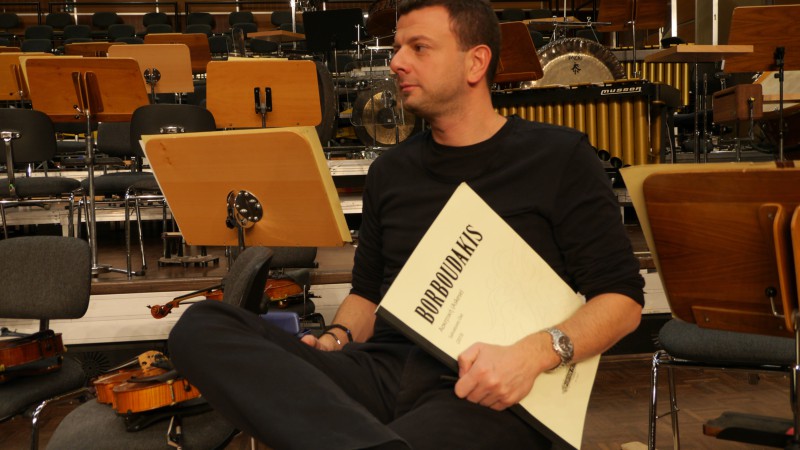 How well does a composer have to know all the instruments used in a musical piece?
How well does a composer have to know all the instruments used in a musical piece?
A composer doesn’t have to know how to play each instrument; what matters is that he be aware of all the possibilities for each instrument, so that he can express in music notation what he has in his mind, and so that the musician can then bring this to life. It is, however, of paramount importance for a composer to know how to play at least one instrument, any instrument, and find himself on stage. It is the practice that matters: composers spend hours on end sitting at their desk, but it is essential to have the experience of performing on stage -a knowledge I always try to pass on to my students- in order to understand the difficulties faced by musicians, to know if what they ask is actually achievable. If you only limit yourself to theory, I’m afraid this will be evident in your music after some point. I strongly believe composers must find themselves on stage on a regular basis, even if their performing skills are not of the highest possible level. I have personally practiced that, and throughout my career I have been on stage, either as a pianist or, lately, as a conductor.
In many of your works you use contemporary instruments, such as live electronics. Is it for you one more means to produce music, or does the combination of traditional instruments with electronics take music making one step beyond?
The issue of the use of electronics in classical music is a very rich subject. In my works I do, as you said, combine acoustic instruments with electronics, but in other cases I use electronic instruments -whether live or recorded, it doesn’t matter- as an “extension” of the acoustic ones. What gives us great freedom is that, unlike their habitual use in pop and rock, electronics provide composers of classical music with an infinite array of possibilities. This is reflected in the resulting music, which can reach far beyond the limits one could fathom. We use more or less the same tools for music making as the popular music industry, but they limit themselves within some very specific frameworks, which, in my opinion, the final result never transcends. We, instead, have the liberty to move within a much larger area, and this, by definition, takes music much further beyond. So, the evolution of electronics that began in the 50’s-60’s, in Paris, Cologne etc. was for contemporary classical composers a tool offering much greater freedom. That is how I use them too.
You used this type of instruments in the opera Z, commissioned by the Alternative Stage of the Greek National Opera. How do you assess this initiative which aims to create a contemporary Greek opera tradition? How was your collaboration with librettist Vangelis Hatziyannidis and stage director Katerina Evangelatos?
The Greek National Opera’s commissioning of operas to young composers is an excellent initiative by Artistic Director Giorgos Koumendakis and Alternative Stage Artistic Director, Alexandros Efklidis; it is really extraordinary because they don’t move within specific limits, as is the case with other institutions. They believe in innovation, they both have great knowledge of the subject and great ideas, and they are impartial in their decisions. This combination creates the best conditions for actual results, for successful results – I use the notion of success not in its strictly commercial sense. Even a commercial failure can help move things ahead; Koumendakis and Efklidis are both willing to take this risk.
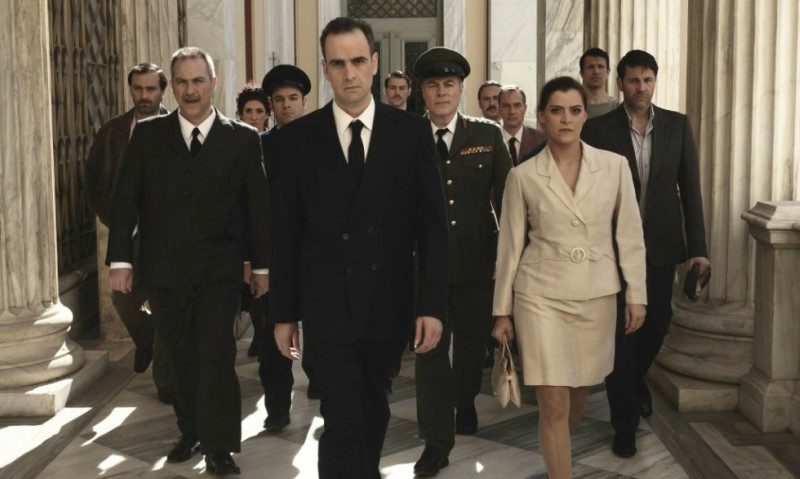 Z at the Alternative Stage of the Greek National Opera (2018)
Z at the Alternative Stage of the Greek National Opera (2018)
This was the context for the creation of Z, an opera that met with a warmly welcoming response from audience and critics alike. I had a wonderful collaboration with literally each and every person involved in the project. When we first discussed it with Vangelis Hatziyannidis, I exposed my vision for the play and he immediately embraced it, he immersed himself in this world, he felt it, and he owned it, which is not something everyone can do. We had an excellent collaboration with Hatziyannidis throughout the composing stage, and when the sheet music was ready, Katerina Evangelatos was brought in. Through meetings and discussions she, too, entered this world and offered her own part. What was very beautiful is that we all worked for the opera, with no sign of antagonism. I believe this was a unique case, and everyone, including the audience, perceived this in the end result.
Eleven years ago, you presented liebe .nur liebe, a non-conventional opera commissioned by the Bavarian State Orchestra. How different was your approach then, compared to Z? Would you be interested in taking up another project like the latest one?
With liebe .nur liebe (love. only love) I took my first step in the musical theatre scene. Z is essentially a follow-up to this experimentation. And I must note that Z is in fact a piece of musical theatre and not an opera; an opera is based solely on song while this is not the case with Z. It is true that is has been promoted as an opera, but in the title of my sheet music I describe it as musical theatre. Well, in any case, Z is, in a way, the completion of the ideas that I had initiated eleven years earlier in liebe .nur liebe.
In the meantime, however, there have been several smaller-scale works of stage music, such as Angels, a dance theatre for percussion quartet, εδιζησ[Á]μην εμε[Ω]υτόν, for voice and live electronics, Fern, an electronics composition for a dance installation. In these works I experimented, in a way, I widened my horizons; and all this process sort of gave off into the making of Z. As for taking on another project of this kind, I guess we’ll see in the future.
Is there a project you are currently working on?
Well, there are several plans for the next two years; what I’m working on right now is Z 4383: it’s basically the train scene from Vassilis Vassilikos‘ book Z, on which the Z play was based. I use certain themes from the opera to create a new work, based on the train scene: it’s a very moving scene, where the spirit of Z’s character follows the train carrying his remains from Thessaloniki to Athens for his own funeral. I use the themes from the opera in a completely different way and following a completely different structure, in order to create a new piece for a big ensemble or rather a small orchestra. It will be presented on July 20, 2018 by the Bavarian Radio Symphony Orchestra Academy, at the Bavarian Radio Studio 2.
In your biography, featured on your official website, it is stated that “some of the focal points in [your] work are time and space, classical philosophy, literature, mythology, and cosmological questions”. Would you elaborate on that?
This is of course a very important issue, but it would probably take many hours to really elaborate on it; in a nutshell, a music composer is like an antenna, receiving and transmitting. So, functioning like that, I receive inspiration from many different directions; these may come from philosophical works, as are those of the Pre-Socratics, whose influences are evident in my works, from mythological themes, from various cosmological theories, also from quantum physics and astrophysics, subjects I have researched – in a purely nonprofessional sense, obviously.
These have formed a major inspiration for me, like the theories of Stephen Hawking, who passed recently. Without ever considering myself either a physicist or an astrophysicist or a philosopher, these subjects arouse my interest and, reading about them, I enter a world which prompts a musical response within me. This is called composition, this is how I can create music, and reflect, in a way, on the themes I have examined while reading.
*Interview by Nefeli Mosaidi
Read also via Greek News Agenda: Vangelis Hatziyannidis: “Writing for an opera was like a puzzle I really enjoyed”; Conductor Markellos Chryssicos on Baroque music and its dialogue with the Greek tradition; Dimitris Kountouras on early music in Greece

